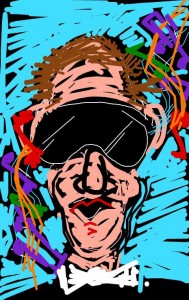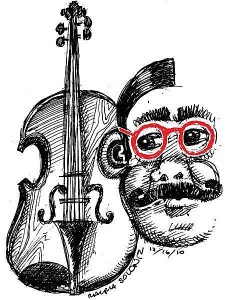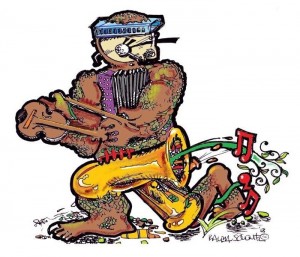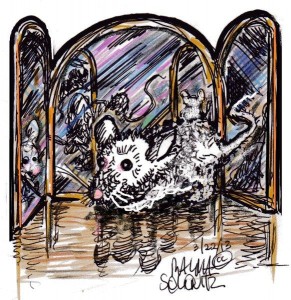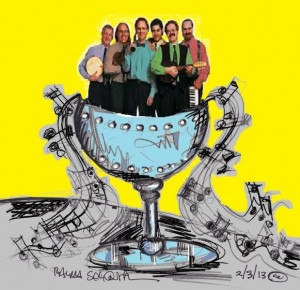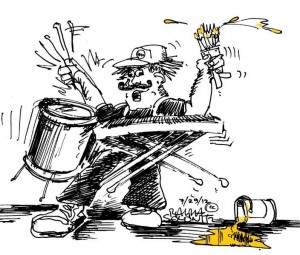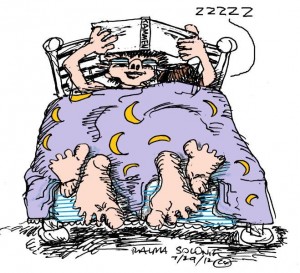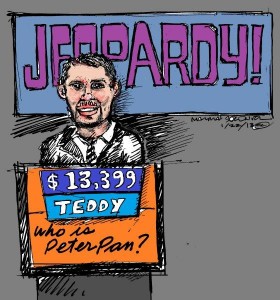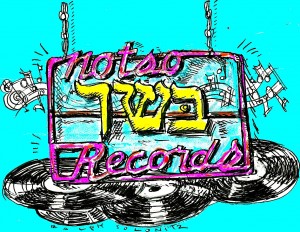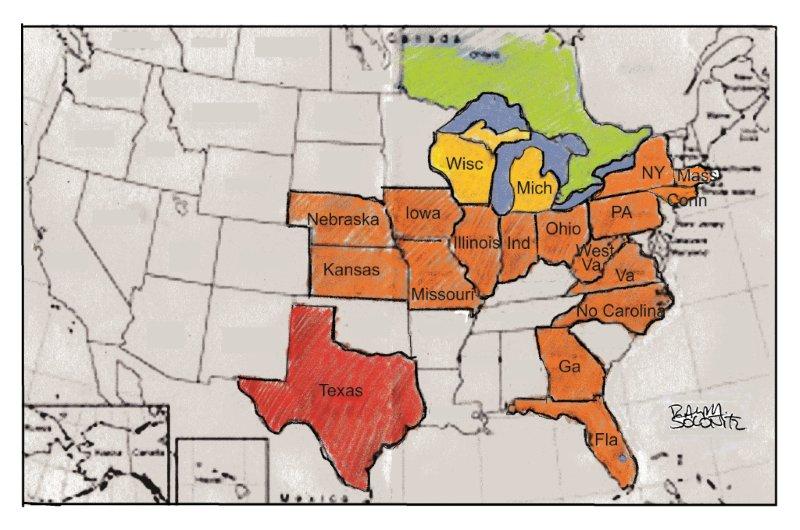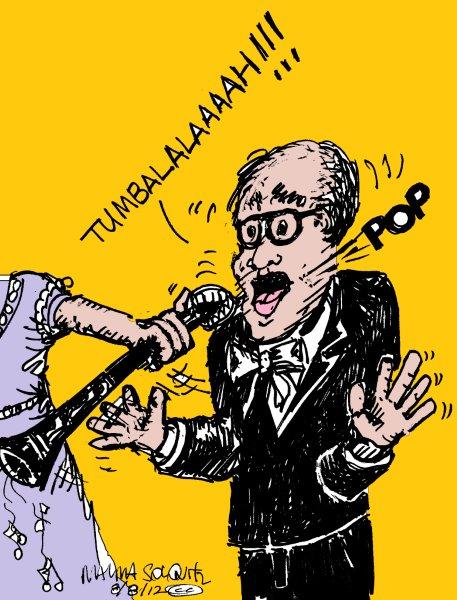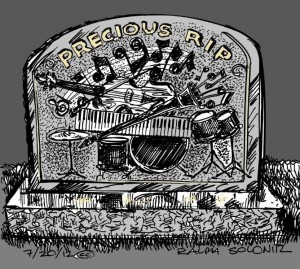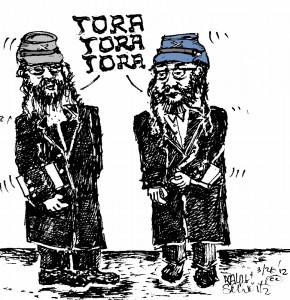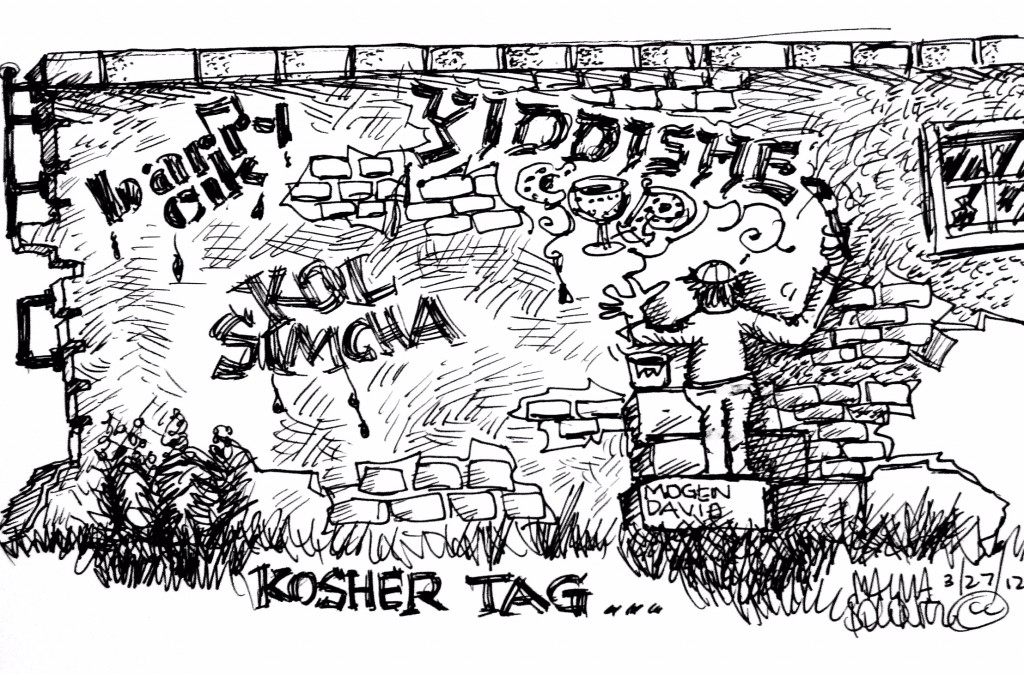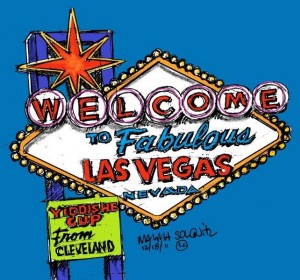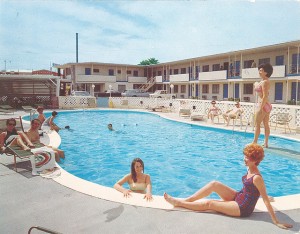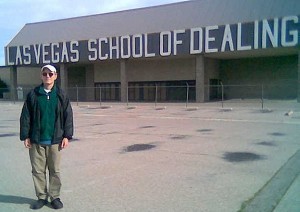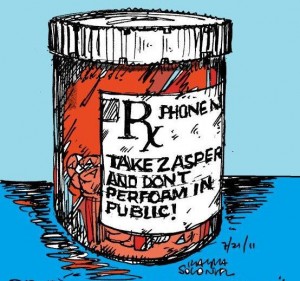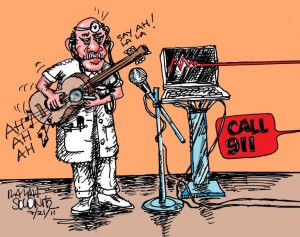Category — Klezmer
THE KLEZMER BLINDFOLD TEST
Yiddishe Cup‘s Bert Stratton tries to identify musicians and songs from selected recordings. Stratton received no prior information. Ratings are 1 to 5.
***
1. “Oy Avram” Yiddish Princess
This recording reminds me of Daniel Kahn, the young Jew in Berlin. Maybe he’s not so young. Let’s call him 35.
Middle age is a long slog, isn’t it? What about 63, is that still middle age?
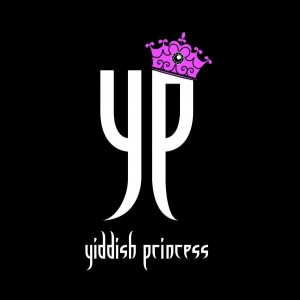 What’s really, really old? Anybody 10 years older than yourself.
What’s really, really old? Anybody 10 years older than yourself.
The lead singer on this is Sarah Cooper — or whatever her name is. She has a leaf blower in her right lung. Sing, baby, sing! I give it a 5.
Sarah Mina Gordon, vocals; Michael Winograd, synths; Avi Fox-Rosen, guitar; Yoshie Fruchter, guitar; Ari Folman-Cohen, bass; Chris Berry drums.
***
2. “Blooz” Michael Winograd’s Infection
My philosophy is do something new every day, but always in relationship to the past and tradition. If I have Kashi Island Vanilla today, I go with Kashi Autumn Wheat tomorrow. Sugar Pops, no thanks. Corn Pops, double no thanks. Call them what you will. Joe’s O’s or Cheerios? Depends. I’ll go with Joe’s on Mondays and Cherrios on Tuesdays. And don’t forget Ralston’s Tasteoos.
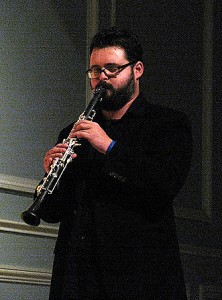
Miguel Winograd
This tune? This is the Wino, Michael Winograd, on clarinet. He constructs his tunes with great care: one note, then silence, then another note. Give it a 5.
Michael Winograd, clarinet; Frank London, trumpet; Daniel Blackberg, trombone; Brandon Seabrook guitar; Michael McLaughlin, accordion; Jason Nazary, drums.
***
3. “Sher 199” Bessarabian Hop. Michael Winograd
Again with the Wino? He’s sucking up all the klezmer oxygen. Is he living in Barcelona? New York? L.A.? He probably has three houses. He’s big.
His clarinet is Canadian, that much I know.
I have no idea who his sidemen are, but they are very, very flexible. They play with time and stretch out the composition. The accordion is a little choppy. It’s a 4.
Winograd, clarinet; Joey Weisenberg, mandolin; Patrick Farrell, accordion; Pete Rushefsky, tsimbl; Daniel Blacksberg, trombone; Nick Cudahy, bass; Richie Barshay, drums.
***
4. “Epstein” Poykler’s Shloft Lied. Matt Temkin’s Yiddishe Jam Band
That’s got to be Temkin. He wears his hat backwards and hangs out in Brooklyn.
I know another backwards hat-wearing drummer, but in Cleveland. My guy is Greek and does apartment cleanups after fires. Married to a Jewish girl. Plays some Jewish.
Frank London is on trumpet. That’s a no-brainer. He’s on every klezmer record.
Clarinet and keys? I have no idea.
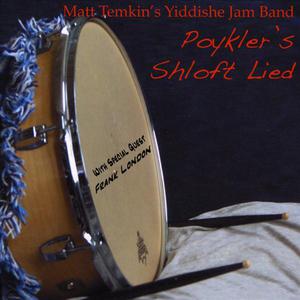 Temkin hires sidemen from the same Brooklyn Home Depot parking lot as Winograd. I wish the Home Depot in Cleveland had this kind of talent. Give it a 4.
Temkin hires sidemen from the same Brooklyn Home Depot parking lot as Winograd. I wish the Home Depot in Cleveland had this kind of talent. Give it a 4.
Temkin, drums; Mike Cohen, reeds; Binyomin Ginzberg, keys; Brian Glassman, bass; Rachel Lemisch, trombone; Allen Watsky guitar: Frank London. trumpet.
***
5. “Baladi” Balada. Bulgarian Wedding Music. Yuri Yunakov
This is Slavic Soul Party. Heavy brass and breakneck tempos. These guys drink slivovitz by the gallon. I have one word for them: slow down. Give it a 3.
Yunakov, alto sax; Neshko Neshev, accordion; Lauren Brody, synth; Seido Salifoski, dumbek; Catherine Foster, clarinet; Carol Silverman, vocals.
***
6. “Shake Hands with your Uncle Max” The Jewish Songbook. Jason Alexander
 Who is the singer? He bears a strong resemblance to an incompetent. Give it a 3. No, a 2. I’m seeing ghosts, I’m fainting. Give it a 1.
Who is the singer? He bears a strong resemblance to an incompetent. Give it a 3. No, a 2. I’m seeing ghosts, I’m fainting. Give it a 1.
Alexander, vocals; Mike Garson, piano; Chuck Berghofer, bass; Don Heffington, drums; Marc Ellis, guitar.
***
7. “Mazl Tov Dances” You Should Be So Lucky! Maxwell Street Klezmer Band
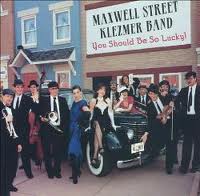 A Mickey Katz tune, yes! This is KCB [Klezmer Conservatory Band].
A Mickey Katz tune, yes! This is KCB [Klezmer Conservatory Band].
Yes, I know the Mickey Katz reboot is over, but not for me. I knew Mickey’s cousin. She was in a nursing home in Cleveland. She was about 100. My hobby is Mickey’s geo-hagiography. I walk by his [former] apartment in Cleveland Heights all the time.
The music is harmonically deep and soulful. Give it a 5. Thank you, KCB!
Ralph Wilder, clarinet; Alex Koffman, violin; Ivo Braun, trumpet; Sam Margolis, trombone; Gail Mangurten, piano; David Rothstein, bass; Steve Hawk, percussion.
***
8. “Meshugge ’bout my Myed’l” Klezmerfats! Peter Sokolow
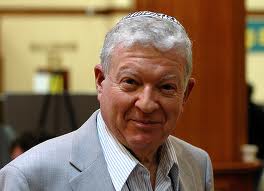
Pete Sokolow
Sokolow is — forgive me — an animal. A rhythmically complex animal. Not only can he bang out chords, he can play — and can he talk; he’ll drey you a kup for three straight hours at KlezKamp, and all good stuff. Read his interview with professor Phil Brown. That’s the best musician interview ever.
Pete combines earthiness, gravity and buoyancy. What’s his weight these days?
I like to guess ages and weights. I’m taking this blindfold off.
Oh jeez, why didn’t you tell me you’re 500 pounds!
Pete, he’s ancient. He’s 73.
A 4 rating.
Sokolow, piano, vocals.
***
9. “Ko Riboyn Olam” Stempenyu’s Dream. Steven Greenman.
I cheated. I should put my blindfold back on. This is Greenman, the LeBron of klezmer violin. But Steve didn’t take his talents to South Beach. He stayed here [Cleveland]. Give Greenie a 5, on that alone.
Greenman, violin, vocals; Michael Alpert, violin, vocals; Pete Rushefsky, tsimbl; Mark Rubin, bass.
***
10. “Rumenye” Homesick Songs. Golem
This is Reverend Gary Davis singing in Yiddish. Joking, man. Really out there, but good. It’s Ezekiel’s Wheels.
This is meaty. I’m guessing the band weighs 1423 pounds, total. I’m close. What’s for lunch? Give it a 4.7.
Annette Ezekiel, vocals, accordion; Aaron Diskin, vocals; Alicia Jo Rabins, violin; Curtis Hasselbring, trombone; Taylor Bergren-Chrisman, bass; Laura Cromwell, drums.
June 26, 2013 9 Comments
COOL WORLD
1. CLEVELAND 1975
I wore red Adidas tennis shoes to an audition for a soul band at E. 91st Street and Union Avenue.
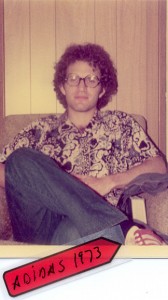 The bandleader, Amos, liked my shoe color and my skin color. He said, “Ain’t no Holiday Inn going to hire no band without a white guy, and right now there ain’t nary a grain of salt in this room.”
The bandleader, Amos, liked my shoe color and my skin color. He said, “Ain’t no Holiday Inn going to hire no band without a white guy, and right now there ain’t nary a grain of salt in this room.”
I wasn’t too good on sax and harmonica, but I got the job.
Amos thought harmonica was corn pone, not a respectable axe for a black man, but it was OK for a white. He said, “We can use that harp. You hip to Tower of Power? They got a bad white dude on harp. You hip to War? Another bad brother of yours on harp.”
The keyboard player had doubts — not just about my playing. He didn’t like Amos’ pot smoking.
The keyboard player broke up the band a few weeks later. He said. “Weed is communicating with the demon.”
“What you think?” Amos said. “What you gonna do when we play cabarets and shit? It ain’t no motherfucking church!”
“I said, I quit.”
Regardless of the church/cabaret conflict, we would have broken up. At our next rehearsal, Amos’ son was on drums, then a woman drummer sat in. The other horn player — an old guy, about 40 — had no teeth. He said, “I can’t play without my choppers.” But he could play. He played bebop.
Amos wanted to try gut bucket blues, even country western. “I’m unemployed! I’ll try anything,” he said.
I stopped by the Hibachi Lounge at Union Avenue and E. 103rd Street, where we were scheduled to play. The bouncer wore a red jump suit and a red wide-brim hat; he shuckled (davened) at the pay phone like he was listening to Dial-A-Jewish-Concept. Several women line-danced to the jukebox.
The women stopped dancing when they saw me.
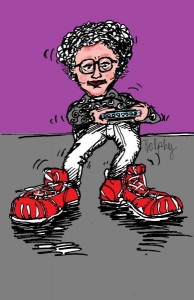
What's happnin', ladies?
Was I cool?
Ask the women. I got out of there.
2. DETROIT 2002
Yiddishe Cup shared the bandstand with a soul band at a fancy wedding. I asked the soul singer if she had seen the documentary Standing in the Shadows of Motown, which had just come out. She said her father, pianist Johnny Griffith, was in it.
The tenor player said, “The movie didn’t feature the horn players. It should have.”
The tenor player tuned up. He sounded better than most Yiddishe Cup jazz solos.
The tenor player liked our klezmer stuff, particularly our “Araber Tantz.” “What kind of scale is that?” he asked.
“In Yiddish it’s called freygish,” I said. (Freygish is the “Hava Nagila” scale: E F G# A B C D E.) “It has a flatted second and a 1½-step leap from the second to the raised third.”
“Very cool,” he said.
About time.
—
Public service announcement.
For all you readers down in Wayne County (Wooster), Ohio.
From Ellen Pill:
Re Don’t Buy From the Jew! A History of Jews in Wayne County, Ohio — 1840-1950.
We are writing a book and looking for any information on early Jewish settlers in Wayne County and surrounding areas: photos; newspaper clippings; personal information; and especially, anecdotes about daily life. Contact Ed Abramson: 330.345.5350 or Ellen Pill: ellenfpill@gmail.com
[Editorial comment from Bert Stratton: Don’t Buy from the Jew. Harsh! My grandfather Albert Zalk ran a “Jew store” in Yazoo City, Mississippi. They liked him down in the Delta. My wife’s grandfather George Rosen ran a “Jew store” in Clarksburg, West Virginia. I was there a few times. The town loved the Rosens.]
June 12, 2013 4 Comments
THE HEYMISH AND THE AMISH
I live near two large Amish settlements — Middlefield, Ohio and Holmes County, Ohio. I know some of the differences between the various Amish sects. Some Amish use battery-powered lights on their buggies. Some don’t. Some use the triangular orange “slow vehicle” sign, some don’t.
 Speaking of guys-in-black, I also know some very frum Orthodox Jews. I know what the crocheted yarmulke means versus the black hat.
Speaking of guys-in-black, I also know some very frum Orthodox Jews. I know what the crocheted yarmulke means versus the black hat.
I’ve only been around Amish and Jews once. I saw an Amish man in the lobby of Green Road Synagogue — an Orthodox synagogue in Cleveland. I said to myself, “I’m wrong.”
This “Amish“ guy was probably a hipster Jew trying to look Amish, with a wide-brim hat, beard, no mustache and a vest. Like Solzhenitsyn.
I saw 15 Amish women in blue dresses and white bonnets come out of the kitchen. They carried parfaits on trays.
Then I saw a horse and buggy at the side door. (How does a horse and buggy get to suburban Beachwood? By truck.)
Solzhenitsyn stacked bales of hay in the temple lobby and brought in chickens. He was John, an Amish from Middlefield, and he worked for an Orthodox Jew who owned a mattress factory and was hosting a sheva brochas (post-wedding dinner). Yiddishe Cup played the dinner. We played our usual repertoire of Yiddish, Hebrew and klezmer. I asked the Amish buggy driver what he thought of the music. He said, “It sounds like Mozart.” Maybe because of the violin?
The man stacking the hay said some Amish in Ohio play harmonica — the 10-hole diatonic model. “That’s all, for instruments,” he said. “Other instruments [like flute, guitar] might lead to forming a band.” A Jewish joke?
The rabbi jokingly asked if Yiddishe Cup knew any Amish songs. We tried “Amazing Grace.” Probably a first for Green Road Synagogue. The Amish liked the song. We also played a Yiddish vocal, “Di Grine Kusine” (The Greenhorn Cousin), which the Amish didn’t seem to go for. I thought they would like our Yiddish repertoire, since the Amish speak Pennsylvania Dutch.
Now I know: go easy on the Yiddish at Amish-Jewish parties.

Alan Douglass, Yiddishe Cup’s keyboard player, Green Road Synagogue, 2011
—-
The Klezmer Guy trio plays Nighttown, Cleveland Hts., 7 p.m. Tues., April 23. $10. Play it safe and make a res: 216-795-0550.
An evening of social commentary, plumbing tips, and song. As if Garrison Keillor was raised on pastrami.
Alan Douglass, piano and vocals; Bert Stratton, clarinet and prose; Tamar Gray, vocals . . .
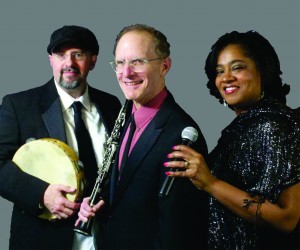
—
Next week “Klezmer Guy” posts up on Tuesday (April 23) instead of Wednesday. Just so I can remind you one more time about the April 23 Nighttown gig.
—
Mazel Tov to Sen. Jack Stratton (I-Calif.) for reaching his goal on Kickstarter. His band, Vulfpeck, hit the mark today.
Jack the Tummler . . .
April 17, 2013 1 Comment
RAT-AND-MOUSE GAME
Brittany, a tenant, said she saw five rats in her kitchen. She hightailed it to her parents’ house in Sandusky, Ohio, and called me. “I’m tired,” she said. “I have to drive in from Sandusky now every day for work.”
“You saw five rats at once?” I said.
“Yes. Your custodian said they were rats,” she said.
“They were probably mice,” I said. I also told her to take $200 off her rent, and we would bring in a professional exterminator.
She said the rats crawled in her bed.
I paid the exterminator $102. He sealed the apartment with caulk and put in mouse traps that looked like miniature tinted-glass limos. Mice crawled into the limos and died. The mice were ready for the mouse funeral parlor.
Brittany showed me a cell phone pic, taken in her kitchen, of a dead rat.
I said, “Mouse.”
“That’s a rat,” she said.
I’ve seen maybe 50 trapped mice and two trapped rats. Rats are much bigger than mice. Rats rip things up. They’re like raccoons in your kitchen. Rats rip bags to shreds. Rats eat through concrete.
“You had a mouse,” I said.
“Rats.”
“Please don’t say rats,” I said.
“OK, rodents.”
Yes! Success.
She moved out.
Rats.
***
Drug Mart has a new mouse trap with an extra-wide feeding plate. I’m not sure it’s a better mouse trap; I haven’t bought one.
My favorite traps are traditional spring-loaded Victors, from Lititz, Pennsylvania.
Drug Mart was out of Victors. I got the Chinese knock-offs. The instructions on the Chinese traps read: Ne pas mettre les doigts dans la trappe. Drug Mart must have gotten the traps from a Canadian buyout. Recommended bait: fromage, saucisson, jambon, beurre de cachuetes. I figured all that out, except saucisson.
I looked up saucisson: French hard salami.
Mice live well in Canada.
I don’t blame my tenant, Brittany, for moving out. A rodent — a mouse or rat –- crawling in your bed is serious. Rodents should stay in the kitchen, where they belong.
—
SIDE B
This will take your mind off rats.
MURKY
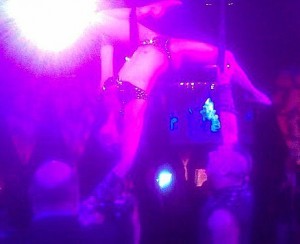
A Yiddishe Cup musician sent this pic from a gig to his friends. (My sidemen are always taking pictures.)
The pic was murky and scary. The musician captioned the photo: “Wildest gig ever. Upside-down acrobat pouring champagne for the guests.”
Another musician – not at the gig – wrote back: “Wild Gig? What did I miss!”
The absent musician missed the upside-down acrobat. Compared to a bar mitzvah, it was a wild gig.
The event was a fundraiser for a community college.
Not salacious enough for you. Right.
—-
Yiddishe Cup plays 6:15-7:45 p.m Mon., April 15, at Landerhaven for Cleveland’s community-wide Yom Ha’atzmaut celebration. Free. David Broza is on at 8 p.m.
—
The Klezmer Guy trio plays 7 p.m. Tues., April 23, at Nighttown, Cleveland Hts. $10. More info here.

Alan Douglass (L), Bert Stratton, Tamar Gray. (Photo by Ralph Solonitz)
April 10, 2013 1 Comment
A ROUGH REVIEW OF
YIDDISHE CUP
Yiddishe Cup calls its act “neo-Borscht Belt klezmer comedy.” That’s been done before — the Borscht Belt schtick. For starters, about 60 years ago.
Yiddishe Cup can fill a golden age center in Miami. Then what? Take it on the road to the Bronx Hebrew Home for the Aged. Then return to Miami and stay there. And don’t forget your meds, guys. You’re not getting any younger.
Has Yiddishe Cup ever toured for weeks, developing a solid groove, establishing decent ensemble chops?
No.
On weekends the band collects inflatable guitars at bar mitzvahs, eats baked salmon, and watches “reflections” videos.
Does Yiddishe Cup research old Yiddish tunes at YIVO? Does anybody in Yiddishe Cup know where YIVO is? [New York.] Or what YIVO means? Does anybody? [Yidisher Visnshaftlekher Institut.]
One more thing: dynamics. Ever heard that word, Yiddishe Cup?
—–
Klez bandleaders, please submit your recordings for review here. You have nothing to gain.
—
SIDE B
This post is a rerun (from 4/20/11). No, I’m not running out of material. I just like this one. Happy Passover.
NOT A PASSOVER STORY
Bialy’s Bagels in University Heights, Ohio, was my bagel supplier for years. I would go swimming; go to Bialy’s and buy 15 bagels; eat two; drive to my mother’s; give her three; and take the rest home.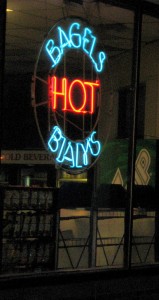
I was on a bagel diet. I thought eating sesame and poppy seed bagels was a smart weight-control maneuver.
My back-up bagel purveyor was Amster’s at Cedar Center. The counter woman there, Marilyn Weiss, volunteered for school levies, racial integration projects, and did a ton of schlep work at my shul. Amster’s was all about Marilyn’s personality. Unfortunately she died in 2000, and the place closed a few years later.
I also went to Better — as in “Better Bagel” — on Taylor Road. The owners were New Yorkers who wore yarmulkes and Brooklyn Dodgers shirts. I figured they knew bagels.
They didn’t. Their bagels were too doughy and not crispy enough on the outside. Better Bagel eventually changed its name to Brooklyn Bagel.
No better.
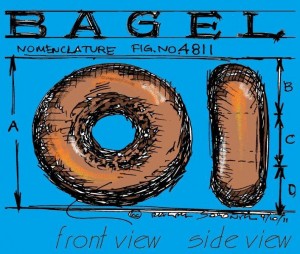
Go to Bialy’s. If Bialy’s ever closes, we’re in bagel trouble in Cleveland.
March 27, 2013 7 Comments
THE COOLEST GUY
IN YIDDISHE CUP
Yiddishe Cup’s drummer, Don Friedman, also goes by the name Donny Mann (as in “Shelly Manne” and “Herbie Mann” — fellow yids).
“Donny Mann” started back in pre-history — the 1970s. “Jan Paderewski gave me the name when we were playing five nights a week at the Blue Fox Restaurant in 1974,” Don said. “Talk about wiseguys. It was all Mafia guys at the bar.”
“Jan Paderewski?” I said.
“Yes. His parents were musicians. They played a lot in Little Italy.”
Jan Paderewski’s great, great uncle was the Jan Paderewski, the renowned Polish pianist and statesman. Jan Paderewski of Cleveland was a stand-up comedian, restaurant owner and pianist. He played light classical and standards. Jan Paderewski of Cleveland died in 2000.
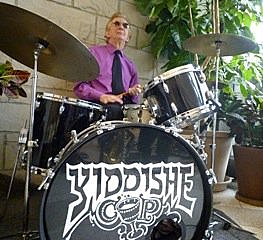
"Donny Mann" 2011
Donny Mann attended Berklee in 1961, when Berklee was just one building with a couple hundred students. Donny dropped out. Back then that was the idea: drop out and play gigs. Still is.
Donny Mann’s first pro gig was pre-Berklee, age 16, in his hometown, Erie, Pennsylvania. Don played with the Stardusters (piano, accordion, alto and drums) every Saturday night at the American Legion Hall. Tunes like “Poinciana” and “Moonlight in Vermont.”
“I heard ‘The House of Blue Lights’ in the late 1950s,” Don said. “That drove me nuts. I loved it.”
Don worked in a hat store in Erie. “My first encounter with retail,” he said. Don eventually worked in a men’s clothing store in Cleveland. And he listened to jazz — Gene Krupa through Tony Williams. “I shied away from rock and roll. It was primitive to me.”
“I wasn’t crazy about New York,” Don said. “Cleveland was the big-time, being from Erie. In the 1950s and 1960s, Cleveland was the big-time — look out, Jimmy Brown! In Erie, I rooted for the Browns, not the Steelers.”
Don worked at Rogers Drums in Cleveland, starting in 1965. He sold drums and musical-accessory chazerai to mom-and-pop music stores, and he gigged at night. “Every other word I said was hip. ‘I’m hip, man.’ I used that too much. I try not to say it nowadays, but it’s hard.”
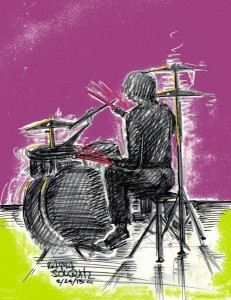 Don hung out at the Theatrical Restaurant. “I was never in the section where you ordered the expensive steaks,” Don said. “I sat at the bar.” He sat behind the featured drummer, behind the bandstand — the best place to watch the drummers’ hands and feet. He saw Cozy Cole, Papa Jo Jones (“He wore white socks”) and Louie Belson, among others.
Don hung out at the Theatrical Restaurant. “I was never in the section where you ordered the expensive steaks,” Don said. “I sat at the bar.” He sat behind the featured drummer, behind the bandstand — the best place to watch the drummers’ hands and feet. He saw Cozy Cole, Papa Jo Jones (“He wore white socks”) and Louie Belson, among others.
“Bob McKee, the house drummer, played a blue onyx Rogers. All the drummers loved that set. It had Swiv-O-Matic hardware. The Japanese copied it. Bobby still has the set in his basement. He’s in his eighties now.
“Philly Joe Jones was at the Theatrical, too. He was more modern than Papa Jo. Buddy Rich was there. Gino too. Gino was a bit past his prime — past his fame.”
“Gino who?” I said.
“Gene Krupa. Everybody called him Gino, at least among friends.”
Ladies and gentlemen, please put your hands together and welcome the coolest guy (by a narrow margin) in Yiddishe Cup: the one and only Don-ny Man-n!
February 27, 2013 2 Comments
MISSISSIPPI BUBBE AND
THE XYLOPHONIST
I look for musical yikhes (lineage/pedigree) wherever I can find it. My grandmother played piano at a white Baptist church in Yazoo City, Mississippi. Not bad.
This Mississippi bubbe — Ida Kassoff Zalk — had a brother, Earl Kassoff, in Cleveland. Earl was a drummer, xylophonist and house painter. He went by the stage name Earl Castle, and led bands in the 1930s and 1940s.
In the 1990s — when I first began looking for musical yikhes — I couldn’t find much info on Earl. I talked to a couple relatives. Earl didn’t leave behind sheet music or tune books. He died in 1969.
At a Yiddishe Cup gig, an elderly musician schmoozed with me. I asked him if he knew Earl Kassoff. Yes, he remembered Earl. The schmoozer was Harold Finger, age 77. He had made a living playing clarinet and sax during the 1930s and 1940s.
I took my tape recorder to Harold’s apartment and interviewed him. He said there were “four or five bands that got the Jewish work.”
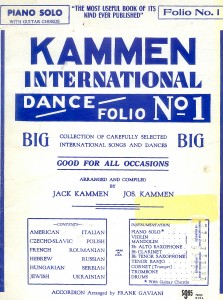 I asked, “What bands?” He didn’t remember the names. “What were the most popular Jewish tunes?” I said.
I asked, “What bands?” He didn’t remember the names. “What were the most popular Jewish tunes?” I said.
He said, “The songs from the Kammen Book. That was the big thing.”
The Kammen International Dance Folio, published in 1924, is still around. The Kammen book is to Jewish music what a sex manual is to sex. (Pianist Pete Sokolow makes this statement at most KlezKamp conventions.)
My Uncle Earl’s band did mostly “dance work” — American music, Harold said. Earl worked the downtown theaters, as well as the Golden Pheasant — a Chinese restaurant where Artie Shaw started.
Harold said he didn’t stick to the melody all the time. He did some “faking” (improvising). Now he played clarinet with a community orchestra. “I don’t do much jobbing anymore,” he said. (Jobbing is gigging.)
Harold died three years after the interview. I thought his kids might enjoy the interview tape, from 1992, so I called a Finger relative and left a message in the mid-1990s.
I didn’t hear back.
The relative should have called! Harold’s wife was on the tape, teasing Harold about how he loved his saxophone more than her. Harold said, “What? I quit playing music for you!”
—
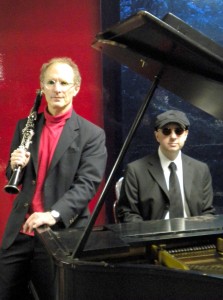 Michiganders, come to the Klezmer Guy show at The Ark, Ann Arbor, Feb. 15. 8 p.m. $20. Bert Stratton on clarinet and prose, Alan Douglass on piano and vocals, Gerald Ross on ukulele and Hawaiian lap steel guitar. Prose pieces will contain words such as “Ann Arbor,” “Michigan” and “Rudy Tomjanovich.”
Michiganders, come to the Klezmer Guy show at The Ark, Ann Arbor, Feb. 15. 8 p.m. $20. Bert Stratton on clarinet and prose, Alan Douglass on piano and vocals, Gerald Ross on ukulele and Hawaiian lap steel guitar. Prose pieces will contain words such as “Ann Arbor,” “Michigan” and “Rudy Tomjanovich.”
—
More on Mississippi Ida — my bubbe — later. Maybe not.
—
Yikhes update. Check out the latest from Jack Stratton’s band, Vulfpeck.
February 6, 2013 6 Comments
IN JEOPARDY
At a Detroit wedding, the bride came down the aisle to Barbra Streisand recordings. She paused several times to read from her childhood diaries. She had 109 journals. (She read only from a handful.)
Eight years later, the bride emailed me and asked if I remembered her.
Yes. And I remembered the bridal dance we had played, and how we opened for a soul band (a good band), and how I announced the bridal party individually; one groomsman was Billy Wisse.
I had said Billy Weiss. He thanked me. I explained to him, “There’s a Ruth Wisse, a Yiddishist and professor at Harvard. I’ve heard the name pronounced before.”
“That’s my mother,” Billy said.
“No! Where do you teach?” I said. The Wisse family is scholarly; David Roskies, Ruth Wisse’s brother, is a professor at the Jewish Theological Seminary.
Billy said, “I write questions for Jeopardy.”
“That’s a job?” I said, pulling out a pen and jotting down Billy’s email address. My son Teddy — a college student then — would love a job at Jeopardy upon graduation. Teddy was on Brandeis’ Quiz Bowl team. (Quiz Bowl is Jeopardy minus the money.)
Two years later, Brandeis played in Los Angeles for the national championship. Teddy was on the Brandeis team. I gave Billy’s email to Ted.
Ted and his Brandeis teammates met with Billy Wisse for breakfast at Canter’s Deli.
Two years after that (2004), Ted got a business call at our house. He had recently graduated college. He wouldn’t pick up the phone. I yelled, “Pick up the phone, Teddy! It’s for you.”
Sony was on the line.
Sony owns Jeopardy. Sony offered Ted a slot on Jeopardy as a contestant. Sony sent a contract via FedEx. One paragraph read (paraphrased): “Do you know anybody from Sony or Jeopardy? If so, you can not be on the show.”
Teddy did not know Billy Wisse! Teddy and Billy Wisse ate breakfast two years prior for one-half hour. Also, there had been other Brandeis players at that breakfast.
At Sony Studios in Culver City, California, Billy Wisse stood by a computer at the edge of the Jeopardy set. Alex Trebek, the show’s host, wore a cast on his wrist. He had fallen off a ladder, he told the studio audience. He had been cleaning his gutters. Sounded odd to me. (I was in the peanut gallery.) A Hollywood guy cleans his own gutters? Maybe. There are low gutters in California.
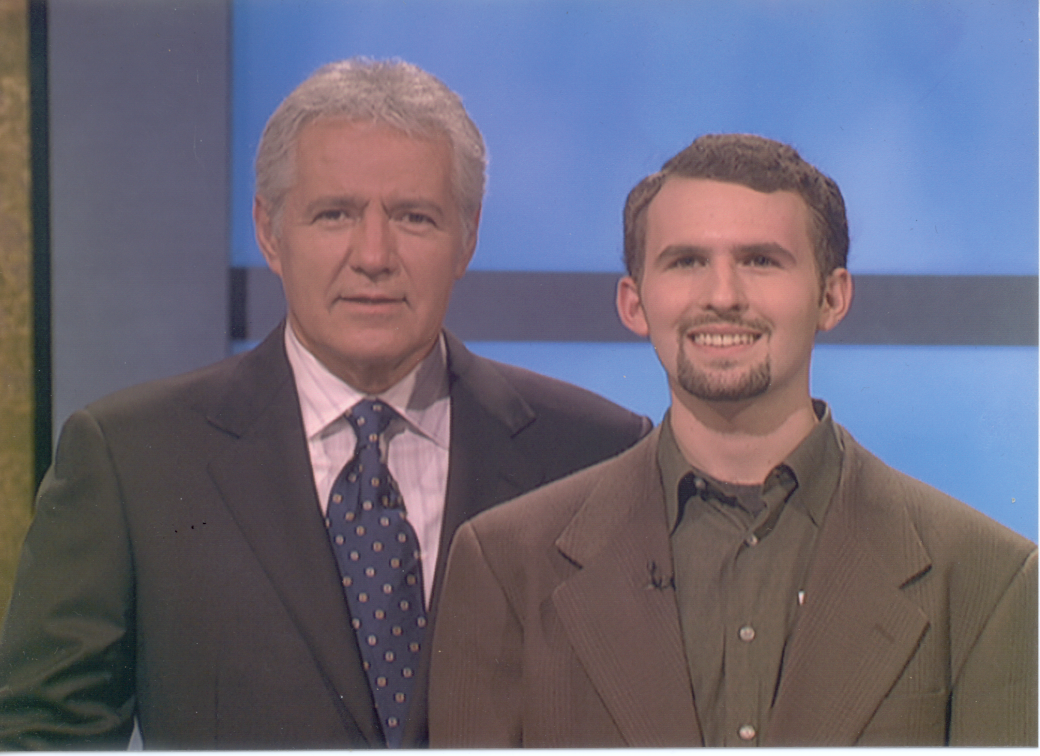
Alex Trebek and Ted Stratton, 2004. (Show aired in 2005)
Jeopardy tapes five shows a day. The show’s contestants for that day sat in rows isolated from the studio audience. Whenever an on-deck contestant went to the bathroom, he or she was escorted by a guard from Standards and Practices, which monitored cheating.
The first game was between an Idaho man, a Washington state woman, and the defending champ, “a schoolteacher from Lancaster, Ohio.”
The Jeopardy stagehand said, “Lights, camera.” But no “action.” Wisse and other Jeopardy employees huddled at the side of the set. They looked at computers and talked to each other. This went on for about a half hour.
Wisse, you do not know my son. Have rachmones (pity), Wisse. You see 11 Jeopardy contestants per day; they’re mostly all young white guys who look alike. You do not know Teddy!
The Jeopardy people couldn’t locate the appropriate random packet of questions for the first game. That was the hold-up. Everything had to be kosher — up to Standards and Practices.
Teddy didn’t play that morning.
Lunch break was at Quizno’s for the peanut gallery. (The contestants ate in the Sony cafeteria.) At Quizno’s, the girl friend of one contestant said, “I don’t care if Jonathan wins or loses. I don’t love him for his game playing.”
Shut up. I was so nervous I couldn’t eat.
Teddy didn’t play the game after lunch either. I asked an usher, “What if my son doesn’t play today?”
She shrugged.
Teddy made it onto the final game of the day. He faced a Boston book editor — the defending champ — and “a graduate student originally from Johnson City, Tennessee.” That was Jeopardy-speak for “a graduate student now living in Cambridge, Massachusetts, doing a post-doc at MIT.”
Ted did well in the Double Jeopardy category “Our Lady,” about Catholic shrines. The “Our Lady” questions covered Our Lady of Czestochowa (Poland), Our Lady of Gethsemane (Kentucky) and several others. This is what my son learned at Brandeis.
Heading into Final Jeopardy, the Tennessee grad student was in first place. Ted was in second, and the defending champ, Boston book editor, was in third.
The Final Jeopardy category was Fictional Children. The answer was: “This boy, introduced in a 1902 book, flew away from his mother when he was 7 days old.”
I felt like I was watching my kid line up a 50-yard field goal at the Ohio State-Michigan game with one second left on the clock. That is the weird part about being a parent — all that collateral joy and pain. Merv Griffin’s Jeopardy think-music ended.
The Boston editor, in third place, answered, “Who is Peter Pan?”
Right-o. She went up to $10,900.
Teddy said, “Who is Peter Pan?” Right. He went up to $13,399.
The graduate student from Tennessee said, “Who is the Little Prince?” He went down to $7,900.
Alex Trebek announced, “The new champion, Ted Stratton, a reporter from Cleveland Heights, Ohio!”
—
Footnote: For $500, “Who is Billy Wisse?” Answer: a mentsh.
For a blow-by-blow of the game, see Robert KS’ J! Archive.
January 23, 2013 No Comments
WEDDING ALBUM
1.
When a groom shops for a band, he doesn’t care what he gets. He is usually on assignment from the bride. I’ve rarely heard a groom say, “Yiddishe Cup is wonderful!” It’s more like “What’s your minimum — minimum hours and minimum rate?”
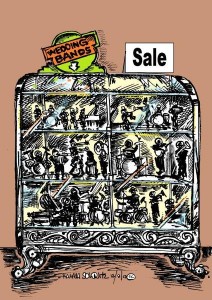 One groom said to me, “Let’s cut to the chase. What’s your price?”
One groom said to me, “Let’s cut to the chase. What’s your price?”
I gave him a fair price and we made a deal. Bye.
A friend told me to act more alive on the phone. She coached me: “Say, ‘Hel-LOH, this is Bert STRAT–tin!’’ I did it that for one day.
If a groom likes the price, beautiful. But he might call the next day and say, “Man, my fiancée is just totally unwavering! She wants this horrible other band now. If it were up to me, I’d have you. Change of plans, sorry.”
“No problem,” I say. “Marriage is full of compromises. Get used to it.”
Old bandleader advice.
2.
When a bride asks about cool wedding venues, I mention Windows on the River in The Flats, the Cuyahoga National Park (Bath, Ohio), the Shaker Country Club and Manakiki club.
Brides — at least some of them — don’t want the standard wedding mill, aka Landerhaven party center, by the freeway in Mayfield Heights.
On a typical Saturday night at Landerhaven, the place is hopping with four or five parties: there is background jazz in the Michelle Room; in the East Ballroom, an Asian Indian DJ; in the Lander Room, Yiddishe Cup. During breaks, I hop from one party room to another, talking to musicians and sightseeing. At a Sikh wedding, the groom rides through the parking lot on a white horse to meet the bride.
Landerhaven’s food is good, and the help is attentive, but Landerhaven is very faux Fontainebleau — so many mirrors and fountains. Brides often want less.
Yiddishe Cup played a gig where the bride married an American Indian by a creek. It rained the whole time. That wedding moved into a lodge, which held, at most, 50 people. We could barely find room to toot our horns. At Landerhaven, you’re not going to have problems like that. Landerhaven is well-run. No surprises at Landerhaven, except maybe the guy on the white horse.
Another option: rent a tent. Some Jews love to worry and the tent is perfect for that. At one tent gig, in Dayton, Ohio, the caterers used 30-gallon wastebaskets to catch the rain pouring in.
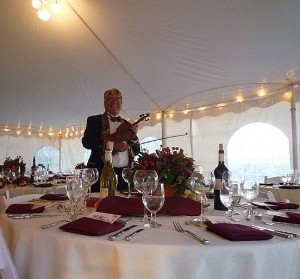
Yiddishe Cup's Steve Ostrow, Hunting Valley, Ohio, 2010. No rain.
3.
Yiddishe Cup played a wedding for an anthropology professor and a German professor.
Here’s how it went down, anthropologically speaking:
a) In the Midwest, the band often works Ohio State and Michigan into the repertoire. The anthro prof’s mother was a Michigan grad, and the groom’s dad was from Ohio State. We played “Hang on Sloopy” for Ohio State and “Hail to the Victors” for Michigan.
b) Yiddishe Cup’s bassist sang “Du, Du Liegst Mir In Herzen.” This bombed. The German guests — real Germans from Germany — didn’t like it. Apparently, Germans don’t show much outward pride in their folk culture. And at a Jewish wedding, who can blame them. (Yiddishe Cup has played “Alouette” for French Canadians and “Guantanamera” for Hispanics, and they like hearing from us.) The Germans were no funt.
c) When Yiddishe Cup had a wedding guest sing with us, I said, “Attention, anthropologists, please welcome one of the stars of Jewish pop. He has appeared all over the world . . . Yehuda Cik!” Yehuda is a former neo-Hasidic Ortho pop star. Yehuda sang the last verse of L’Cha Dodi, the Sabbath welcoming prayer. Big hit.
4.
Sometimes the bride and groom are starry-eyed; sometimes, not.
Years later I run into the moms of the brides. The moms tells me the “kids” are now divorced — the starry-eyed kids.
I run into an old groom. He says, “Isabel and Isaac, this is Mr. Stratton. He played Mommy and Daddy’s wedding.” Was the groom starry-eyed at his wedding? Give me a break. I can’t remember. I play a lot of weddings.
The groom is still married after 12 years. He says his daughter’s bat mitzvah is coming up. “She’s a popular kid,” he says.
“That’s bad. Popular kids usually want DJs,” I say.
—
Two add-ons . . .
1. Dave Brubeck vid
—
2. On the CoolCleveland.com website, 12/6/12. “Keep the Plain Dealer Dealin’.”
December 11, 2012 2 Comments
THE TOP 12 KLEZMER RECORDS
OF 2012
My desk is piled high with free CDs: Ezekiel’s Wheels, Golem, all kinds of Dutch and Polish bands, and the old standbys — Klezmer Conservatory Band and the Klezmatics.
The 12 best klez CDs of 2012 jumped out of the pile and said, “Kiss me, I’m Jewish.”
These recordings (listed below) are the nonrequired klezmer albums for the year. These recordings are essential:
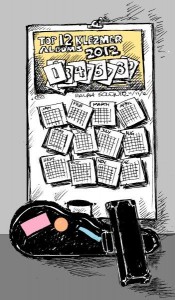 1. Orlando, 3 Days, 2 Nights. Frank London and his Klezmer Brass All-Stars lead us on a klez tour of Disney World. Talk about selling out – but a good selling out. The cut “Mickey’s Philharmonic” features London on electric toothbrush — pulse position. “Whistle While You Work” is all about short people — Jewish short people: Billy Crystal, Abe Beame and Menachem Begin, and that’s just the first 30 seconds.
1. Orlando, 3 Days, 2 Nights. Frank London and his Klezmer Brass All-Stars lead us on a klez tour of Disney World. Talk about selling out – but a good selling out. The cut “Mickey’s Philharmonic” features London on electric toothbrush — pulse position. “Whistle While You Work” is all about short people — Jewish short people: Billy Crystal, Abe Beame and Menachem Begin, and that’s just the first 30 seconds.
2. I Believe in Cod. Andy Statman flips out. Sample lyrics: “May cod bless you and guide you . . . . Praise cod in the high heaven and in the deep sea . . . Teeming oceans, fire and hail, snow and mist, storm and wind, obey cod’s will.”
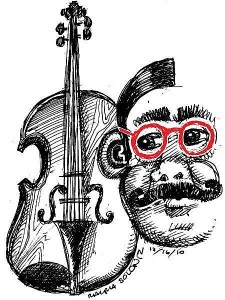 3. The Room Where I Was Born. Violinist Steven Greenman recreates the aural architecture of his childhood bedroom in Pittsburgh. Check out the Steelers pennants and Fiddler on the Roof LPs. Greenman does a cover version of the Klezmorim’s “Medyatsiner Waltz,” which itself was a cover. Sweaty and no A/C.
3. The Room Where I Was Born. Violinist Steven Greenman recreates the aural architecture of his childhood bedroom in Pittsburgh. Check out the Steelers pennants and Fiddler on the Roof LPs. Greenman does a cover version of the Klezmorim’s “Medyatsiner Waltz,” which itself was a cover. Sweaty and no A/C.
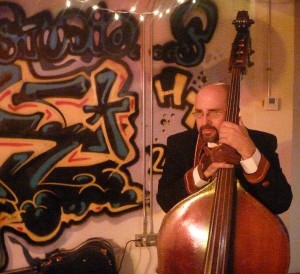
Alan Douglass, Yiddishe Cup enforcer, 2011
4. This Can’t Be Klezmer by Yiddishe Cup. This Ohio band goes outside the matzo box and constructs a toy jail, complete with corporal punishment. Perfect for the heartbroken, horny and dead. Yiddishe Cup mixes barely adequate musicianship with a touch of humor. On “Toot,” an earthy trombone solo morphs into a mimicry of flatulence. It doesn’t sound like klezmer, but what did you expect from This Can’t Be Klezmer?
5. Nonhierarchical Dynamics by tsimblist Pete Rushefsky. Nothing on the 1 and 3; it’s all off-beats. Drives you crazy, but in a provocative way. There is an after-party. You have to be in New York City to get full value. Beer by Brooklyn Brewing. Be there.
6. The Recluse by Merlin Shepherd. Shepherd, a British clarinetist and actor, reads Thomas Hardy poems while his wife, Polina, does consecutive Russian translation. The clarinet licks are sparse, but apropos to lyrics. Novel.
7. Correspondence by Michael Wex. Wexmaniacs, you’ll love this: 60 LOL minutes of Wex badinage from his KlezKanada emceeing. Can anybody top Wex’s Walter-Brennan-is-a-Jew riff? No. Almost as good: Wex’s riff about trash-talking Miami Heat Yiddish-spewers. All but LeBron, who remains the Hebraist.
8. Odorless and Colorless. Shtreiml. Bandleader Jason Rosenblatt spent years in the lab on this one. This record is rotten. It contains sulfur. Le jazz hot — and funky — from Montreal.
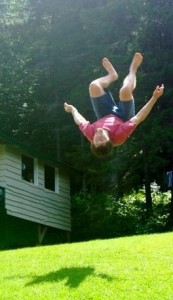
Jack Stratton, about 2008
9. Without a Net. Acrobat-and-drummer Jack Stratton uses metal parts from surgeries gone bad — mostly hip replacements — to perform Meron-klez drum licks. Particularly good: “Blur Blind,” “Bodies Thrown Back” and “Clarity.” The rest of the album is pretty conventional.
10. I Want to Make You Edible by Yiddish Princess. Lead singer Sarah Gordon does freestyle rapping here about cereal (Kashi Autumn Wheat and Island Vanilla), which leads to kishke, which leads to ka-ka. Juvenile. And fun!
11. Red-Dirt Jewboys. Margot Leverett and the Klezmer Mountain Boys go down to Georgia on this one. How does Margot balance her terrific cross-cultural composing and heavy drinking? Margot is the klezmer mixologist for the 21st century. Her next album is, efsher, Klezmer Gamelan?
12. Blackout. Henry Sapoznik and the Original Klezmer Jazz Band give us a wake-up call: Pete Sokolow pounds stride-piano chords while Sapoznik plays electric banjo. On the last cut, Sapoznik smashes his banjo and picks up a clarinet. Tons of squeaks. Sapoznik whines like a fourth-grader at the end: “I quit! I quit!”
December 5, 2012 6 Comments
THE ELECTORAL COLLEGE
(OF YIDDISHE CUP)
Yiddishe Cup has played in 19 states and Ontario.
Our most recent state is Massachusetts.
I didn’t tell anybody about our Massachusetts gig, except Ari Davidow, the dictator of Klezmershack, a Boston-based website.
I didn’t shout, “We’re playing Boston!” Wouldn’t be right. I didn’t want to drive the Mass. bands crazy. There are so many good Jewish wedding bands in Massachusetts.
How did Yiddishe Cup get the Massachusetts gig? Connections. My cousin Margie. She hired us for a wedding.
Mass. football huddle
The band stayed at the Marriott near the Natick mall. The food court at the mall had take-out Indian food; you don’t see that very often in Cleveland.
Notice, we haven’t played Kentucky. That irks me!
Daniel Ducoff — Yiddishe Cup’s Sir Dance-a-lot — collects refrigerator magnets of states Yiddishe Cup has played. Twelve years ago, I gave Daniel magnet-investment advice. I told him to buy “Kentucky.”
Kentucky is ridiculously, abuttingly close to Ohio.
What’s with Texas? We’ve played Texas three times. Once at Temple Emanu El in Dallas, and twice at the Chamizal National Memorial park in El Paso.
Some people think Yiddishe Cup plays only in Cleveland. I hope this map straightens them out.
Buckeyes and fellow travelers, here are the Ohio towns we have played. (Obama and Romney have nothing on Yiddishe Cup.):
Elyria, Akron, Lorain, Warren, Youngstown, Oberlin, Wooster, Lakeside, Toledo, Springfield, Alliance . . .
Kent, Canton, Granville, Gambier, Lancaster, Findlay, Columbus, Delaware, Hiram, Cincinnati, Dayton, Oxford, Celina, Urbana.
You can find good Arabic food in Toledo.
Gambier is not a real town. It has a post office, bookstore, pizza parlor and Kenyon College. Mount Vernon — an authentic town –- is just a few miles from Kenyon. Hey, we played a wedding in Mount Vernon. Please add “Mount Vernon” to the list.
Yiddishe Cup probably won’t play on the West Coast unless one of my sons marries a West Coaster and the wedding is out there. That’s our best hope. Boychicks, you can use a DJ for the breaks. No problem.
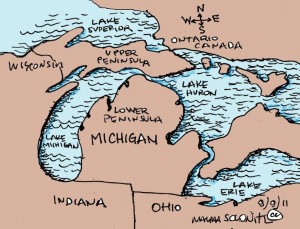 Yiddishe Cup’s number-two hang-out state is Michigan . . . Ann Arbor, Detroit, Flint, Kalamazoo, Calumet, East Lansing, Evert and Grand Rapids.
Yiddishe Cup’s number-two hang-out state is Michigan . . . Ann Arbor, Detroit, Flint, Kalamazoo, Calumet, East Lansing, Evert and Grand Rapids.
Calumet is in the Upper Peninsula. We flew there via Minneapolis. We should have played for change in the Minnie airport so we could color in Minnesota on the map.
Michigan has so few cities. What percentage of Michiganders live in Metro Detroit? My guess is 33 percent. [42 percent –- Google.]
Mappin’ . . . Have you looked at a map today? (Electoral College maps don’t count.)
—-
My op-ed “It’s Campaign Season; Ohio is Swingin‘ was in the Sunday Cleveland Plain Dealer. (Similar to post below.)
November 6, 2012 2 Comments
FLOOR COLLAPSES AT WEDDING
Egos Bruised, Teeth Jarred
Yiddishe Cup played a wedding in a backyard in Connecticut where the floor partially collapsed. The ground became soggy underneath the tent, which was built into the side of a hill. The tent grid work — which supported the plywood floor — sunk. About 50 semi-drunken partygoers did athletic hora steps and pogo-ing, and the floor buckled.
The groom’s mom told me to stop the music.
I didn’t. You can’t stop the hora at a wedding; it’s bad luck for the marriage. I said, “Two more minutes.” She said no, and jumped onto the bandstand and yanked the saxophone from my mouth. Luckily, I wasn’t playing clarinet (different embouchure, more likely to damage my teeth). I said, “Don’t ever do that again!” She was oblivious to me. She frantically dialed her phone for a repairman.
The tent-repair crew arrived shortly, and during a break the crew crawled under the tent and put in extra supports. The mom had the band playing only background music. We sounded like a string quartet at a funeral. We didn’t want anybody to dance, because the floor would collapse even more. We had traveled 500 miles to play tepid tunes like “Jerusalem of Gold” and “Tumbalalaika,” and have my ax yanked. What a letdown.
The dancing picked up after the repair crew fixed the support grid work. Lots of ruach (spirit), and no more assaults on my teeth.
***
SIDE B
Watch out, literature here . . .
THIRTEEN JEWS
IN CONNECTICUT
I.
13 Jews are in line
for omelets
II.
A woman says
“Do I want the mushroom omelet?”
Is she talking to me?
No
To herself
III.
The beauty of the East Coast
Red maples in Connecticut
We’ve come a long way
IV.
Why do I imagine everybody at this wedding
is thin and wearing black?
Because everybody is thin and wearing black
VI.
“You’re from somewhere near Hungary,” I say
“Finland,” the woman says
“Don’t they share a language bond?”
“Distantly”
I’m on a losing streak with accents
IX.
Where is the euphony?
This band is loud
This band is Yiddishe Cup
Turn it down, guys!
XIII.
We are in the Berkshires
The leaves are falling
So are we
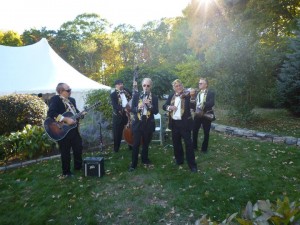
The tent and Yiddishe Cup, Lakeville, Conn., 2010
—
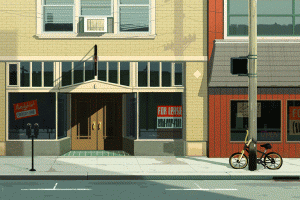 I wrote this op-ed, “Main Street’s Landlord,” for the New York Times, 9/30/12. (Illustration by
I wrote this op-ed, “Main Street’s Landlord,” for the New York Times, 9/30/12. (Illustration by
Rebecca Mock.)
—
Yiddishe Cup plays for Simchat Torah 7 p.m. Sun., Oct. 7, Fairmount Temple, and 7:15 p.m. Mon., Oct. 8, Park Synagogue. Cleveland.
October 3, 2012 3 Comments
A LOVE SUPREME
The Jazz Temple was a music club in a former Packard showroom at Mayfield Road and Euclid Avenue. Coltrane played there. Dinah Washington too. 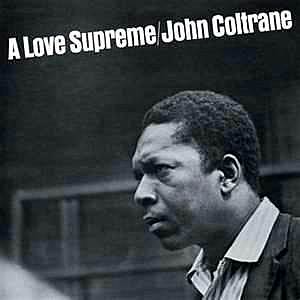 Everybody played there. The Jazz Temple was in business from 1960 to 1963.
Everybody played there. The Jazz Temple was in business from 1960 to 1963.
I passed the Jazz Temple weekly on my way to Sunday school at The Temple, a Reform synagogue in University Circle, Cleveland.
Rabbi Abba Hillel Silver was the head rabbi at The Temple. Rabbi Silver was very prominent; he spoke at the United Nations, advocating for the establishment of the state of Israel. Rabbi Silver’s son, Danny, was the assistant rabbi. He played football at Harvard and blocked hard for his dad.
The Sunday school kids at The Temple were mostly from Shaker Heights. One kid got a ride in a limo to shul. The driver wore a chauffeur’s cap.
I couldn’t grasp how temple — the word — fit into a non-Jewish setting, like in “Jazz Temple.” Was Jazz a religion too? (Give me a break. I was 10.)
Years later, I met a couple ex-beatniks who had been old enough to go to the Jazz Temple in the early 1960s. They had heard Trane and Ella.
The Jazz Temple was blown up in 1963. Somebody didn’t like the club, or the owner, Winston Willis, a controversial black businessman.
At The Temple, the religious-school kids would attend the last part of the service and hear the sermon. Rabbi Silver looked like God and talked like Him.
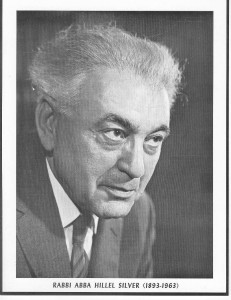 Today, at The Temple East in Beachwood, there is an Abba Hillel Silver memorial study. The rabbi’s desk is laid out like he just stepped out for lunch. He died in 1963.
Today, at The Temple East in Beachwood, there is an Abba Hillel Silver memorial study. The rabbi’s desk is laid out like he just stepped out for lunch. He died in 1963.
Rabbi Silver: Live at the Jazz Temple. Interesting.
John Coltrane: Live at The Temple. Another possibility.
A love supreme . . .
A love supreme . . .
—
SIDE B
PRECIOUS
In the arts, if you’re precious, you’re bad. Precious is the worst thing. Precious means you’re dainty and overly refined.
A friend (a former music critic) called all college a cappella music precious.
Harvey Pekar called Willio and Phillio — the Cleveland music-comedy duo — precious. (Willio and Phillio was around in the 1980s.) Willio and Phillio was precious — their stage name for sure. Willio (Will Ryan) went out to Los Angeles to work for Disney, and Phillio (Phil Baron) became a cantor in L.A. They were good, and probably still are.
Yiddishe Cup is precious occasionally. The musicians say “oy vey” too much on stage. I’ve tried to get my guys to stop. I can’t.
Peter Laughner, a Cleveland rocker, died from drug abuse and alcoholism at 24. He killed himself, basically. (This was in 1977.) He was not precious. He was dead — and funny — about art. He was in the Pere Ubu underground before Pere Ubu was famous.
Suicide doesn’t appeal to me for two reasons: 1) My wife would kill me if I tried it. 2) I want to attend my kids’ weddings and eventually meet my grandkids-to-be.
“Precious” is OK for grandkids. (“Grandkids” is precious.)
—
SIDE C
New construction — Side C — for Michiganders. . .
THE LODGE
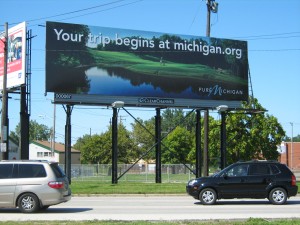
Chester Ave., Cleveland, 2011
I drove to Rochester, Michigan, which is not as cool as Rochester, New York, but it does have a small-town charm.
I’ve seen Father Coughlin’s former church in Royal Oak, Michigan.
I’ve been to Detroit many times.
My wife, Alice, said, “Detroit has very long roads.”
She probably meant Woodward, Gratiot and Telegraph.
Detroit also has the Lodge. Elmore Leonard mentions the Lodge in his books, like, “The gambling casino, Mutt, you can’t fucking miss it, over by the Lodge freeway.”
A couple Cleveland freeways and bridges have names, like the Bob Hope Memorial Bridge, but nobody ever uses the names.
I stayed at a hotel near the Silverdome, which looked like a big pillow. (The stadium did.) A Detroiter told me the Silverdome sold for about $200,000. A stadium for the price of a California carport.
Who was John C. Lodge? Probably a labor leader. [No, the mayor of Detroit in the 1920s.]
Detroit is like Cleveland. Detroit has the Eastern Market; Cleveland has the West Side Market. Detroit has downtown casinos. Now Cleveland has a downtown casino.
Metro Detroit has a few more Jews than Cleveland. And probably more Arabs, Poles and Ukrainians. And more blacks.
People who wear Tiger caps are cool, as are Indians cap wearers.
What about Berkley, Michigan? Is that worth a visit?
Elmore Leonard eats at the Beverly Hills Café. I wonder if that’s part of the Beverly Hills Café chain, or an independent restaurant in Beverly Hills, Michigan.
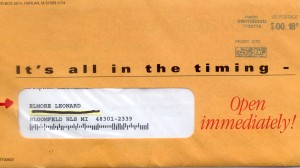 I wonder if Elmore Leonard spends his winters in Detroit. I bet he doesn’t. He writes a lot about Florida.
I wonder if Elmore Leonard spends his winters in Detroit. I bet he doesn’t. He writes a lot about Florida.
I have some Elmore Leonard junk mail.
City Primeval: High Noon in Detroit. That’s worth reading.
Maple means 15 Mile. Big Beaver is 16 Mile.
What about Oakland University? Does the university have Bobby Seale barbecue sauce in the cafeteria?
I live only three and a half hours from Berkley, Beverly Hills and Oakland.
—
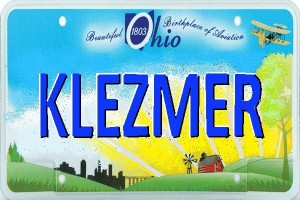 Yiddishe Cup pulls into Motown Sunday. See us at Cong. Beth Shalom, Oak Park, Mich.,
Yiddishe Cup pulls into Motown Sunday. See us at Cong. Beth Shalom, Oak Park, Mich.,
2 p.m., Sept. 9. Open to the public. Concert info here.
September 5, 2012 7 Comments
WHAT’S UP, HANKUS NETSKY?
I see Hankus Netsky, the leader of the Klezmer Conservatory Band, every couple years.
He never remembers my name.
I don’t hold that against him. His best greeting is “How is your Mickey Katz project coming?” (Yiddishe Cup is at times a Mickey Katz cover band.)
I’m flattered. Hankus remembers something about me.
How many musicians does Netsky see in a week? A lot. He teaches at the New England Conservatory, leads a well-known klezmer band, does music projects at the Yiddish Book Center, and plays in a world music group.
I’m Netsky to some people. I don’t know these people but they know me. For example, Oberlin and Cleveland State students attend Yiddishe Cup gigs, looking for term-paper material, and I don’t remember who they are when they call me three months later.
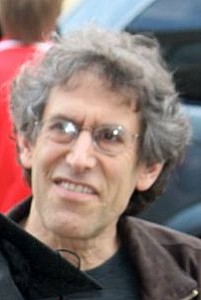
Hankus Netsky
I wonder who says to Netsky: “Sorry, I don’t remember your name.”
Nobody says that to Netsky. Obama doesn’t, Romney doesn’t, Perlman doesn’t. Sapoznik doesn’t.
Netsky, the Great One . . .
—-
Footnotes:
1. Hankus Netsky’s wife is Clara Netsky. Say that. (Don Friedman, Yiddishe Cup’s drummer, concocted this pun.)
2. Ring Lardner Jr. said a well-known person will not remember you unless you’ve been introduced at least five times. (This Lardner Jr. factoid courtesy of Mark Schilling.)
3. Hankus Netsky is a great guy. One of the nicest, smartest, most considerate guys on the klezmer scene. Seriously.
—
SIDE B
Qué pasa, Harvey Pekar? Vos machst du, Michael Wex? . . .
MÁS ACCLAIM
1.
Harvey Pekar’s reputation took off on December 31, 1979, when he got a rave in the national press — The Village Voice — for the first time. But he wasn’t happy.
He told me in 1980, “Movies, interviews — it all falls through. Maybe I’m bowed — my back is short. I’ve got to become more famous. If you’re not a doctor in this town [Cleveland], you’re stuck. The comic-book thing has picked up some, but it doesn’t mean anything in this town. I’d love a groupie to screw, listen to records with, and leave me alone.”
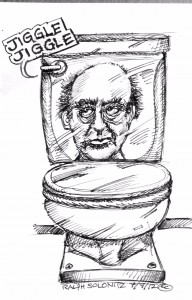 Harvey’s woe-is-me schtick was no schtick; he was down and out. Even after he became famous — after the movie American Splendor — he kvetched a lot: he had money worries, he said; his family scene was precarious; his health was tenuous; and his toilet handle jiggled. Harvey was the guy with the perpetual toothache who thought happiness was not having a toothache. He never ran out of material.
Harvey’s woe-is-me schtick was no schtick; he was down and out. Even after he became famous — after the movie American Splendor — he kvetched a lot: he had money worries, he said; his family scene was precarious; his health was tenuous; and his toilet handle jiggled. Harvey was the guy with the perpetual toothache who thought happiness was not having a toothache. He never ran out of material.
After American Splendor, the movie, Harvey sat on his porch, and fans from all over the world stopped by. He met interesting people without going out.
I went with a foreign fan to Harvey’s porch. The fan and Harvey BS’d for an hour, mostly about Harvey’s upcoming projects.
2.
Michael Wex was on Fresh Air, Terry Gross’s radio show, one time. Pekar was on Terry Gross twice.
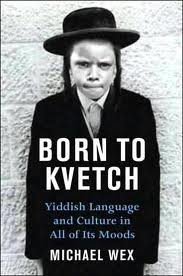 Wex was on the show for his book Born to Kvetch. When Wex’s second book, Just Say Nu, came out, he tried to get on again, but didn’t make the cut.
Wex was on the show for his book Born to Kvetch. When Wex’s second book, Just Say Nu, came out, he tried to get on again, but didn’t make the cut.
Wex wrote on his website: “I don’t want a niche, I want an empire!” Funny — and true. In the arts, the more fame the better until you need bodyguards.
3.
I was standing in the prescription pick-up line at CVS with fellow AKs. The man behind me said, “Saul Ludwig, here. You played my daughter’s wedding. Not only that but we also saw you at Chautauqua.”
“I remember you,” I said. “Your daughter is Amy Shulman. I ran into her at a gig in Buffalo.”
“Shuman.”
Give me a break, Saul. Do you know how many weddings I play? Shuman, Shulman, abi gezunt. I can’t even go to CVS anymore.
—
Joke, Saul, joke.
—
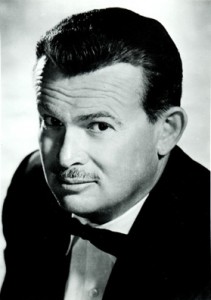
Mickey Katz
I wrote this article, “Mickele: Mickey Katz Lives,” for the Cleveland Jewish News, 7/27/12. More than you want to know about Mickey Katz, probably.
Yiddshe Cup performs a tribute to Mickey Katz 7 p.m. Thurs., Aug. 9, at Cain Park, Alma Theater, Cleveland Hts.
Tix: www.cainpark.com, 216-371-3000, or 800-745-3000.
$20-22 advance. $23-25 day of show. Discount for seniors and students.
August 1, 2012 4 Comments
PUNCHES WERE THROWN
Rabbi Samuel Benjamin — from my synagogue — was arrested by the cops and beat up by congregants. Then he got fired. He went off to Jerusalem.
He resurfaced stateside in Jacksonville, Florida.
This was in 1926. Rabbi Benjamin fought the great Conservative-Orthodox civil war at the Cleveland Jewish Center, East 105th Street, in the early 1920s.
Rabbi Benjamin oversaw the construction of a huge new sanctuary, complete with a swimming pool, and was supposed to keep the shul Orthodox. He tried. But the Conservatives wanted him out. Punches were thrown. One of the punchers was a certain Philip Rocker. Check it out.* The rabbi left town.
The Cleveland Jewish Center, aka the “Polish synagogue,” aka Anshe Emeth Beth Tefilo, stayed at East 105th Street for a couple decades, then moved to a park-like setting in Cleveland Heights.
I belong to the Heights shul — Park Synagogue. I do not see any signs of civil war. Very few congregants know about Rabbi Benjamin.
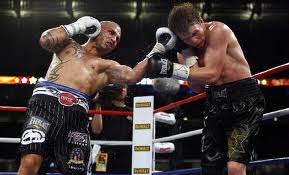 Rabbis don’t get in fights like they used to, either. Does any rabbi don boxing trunks with the Jewish star? I think there is a Russian rabbi in New York who does. [Yes, Yuri Foreman. Photo: Foreman taking a punch from Miguel Cotto.]
Rabbis don’t get in fights like they used to, either. Does any rabbi don boxing trunks with the Jewish star? I think there is a Russian rabbi in New York who does. [Yes, Yuri Foreman. Photo: Foreman taking a punch from Miguel Cotto.]
My rabbi doesn’t fight — my guess. If he does, he’s a welterweight. He’s not big.
Some rabbis play basketball. Several Cleveland rabbis played an exhibition basketball game at the Cleveland Cavaliers pre-game this month. There was no score in ten minutes.
Next year for the pre-game, the rabbis should reenact the Conservative-Orthodox civil war of 1921.
—
* “Near [Rabbi Benjamin’s] house was Philip Rocker, son of Samuel Rocker of The Jewish World. He waited for the rabbi and when he saw him he attacked him and beat him up quite severely.” From Jewish Life in Cleveland in the 1920s and 1930s by Leon Wiesenfeld, 1965.
—
SIDE B
Jumping ahead about 90 years . . .
THE JEWISH WEDDING BAND WARS, 2009
The Orthodox Jewish (OJ) music scene is centered in New York City, where most of the OJ gigs are.
An OJ band not based in New York is called an “out of town” band, even if the band plays its own hometown. There are a couple home-grown “out of town” OJ bands in Cleveland.
The Barry Cik Orchestra dominated the Orthodox Jewish Cleveland music scene in the 1980s. Cik had yikhes (lineage), coming from a long line of distinguished Hungarian musicians. I played a couple gigs with him. His talented son Yehuda became an Ortho pop star.
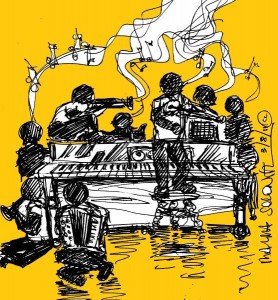 Barry Cik was superseded in Cleveland by the Kol Simcha Orchestra in the 1990s. Some bridal couples perceived Cik as not being frum (religiously observant) enough. The Orthodox world, in general, was becoming increasingly more ritually observant.
Barry Cik was superseded in Cleveland by the Kol Simcha Orchestra in the 1990s. Some bridal couples perceived Cik as not being frum (religiously observant) enough. The Orthodox world, in general, was becoming increasingly more ritually observant.
Cik placed an ad in the Cleveland Jewish Times (no longer in existence) in 1991 that read in part: “I am as scrupulous in shimras Shabbos [guarding the Sabbath] as I can be, and I don’t believe that I’m any less Shomer Shabbos [Sabbath-observant] than most anybody else.”
Cik sometimes played for non-Orthodox Jewish simchas (celebrations) with mixed dancing — men and women dancing together. Kol Simcha — the new band– typically didn’t play for mixed dancing. Kol Simcha picked up a chunk of Cik’s frummer gigs.
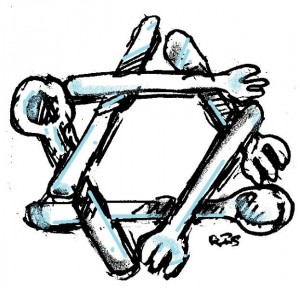 Kol Simcha’s drummer got in trouble for using treyf (non-kosher) meat at his kosher Chinese restaurant, so he left town. Still, Kol Simcha — the band — stayed in business. The lead singer, Rabbi Simcha Mann, was a very good singer.
Kol Simcha’s drummer got in trouble for using treyf (non-kosher) meat at his kosher Chinese restaurant, so he left town. Still, Kol Simcha — the band — stayed in business. The lead singer, Rabbi Simcha Mann, was a very good singer.
Several years later Simcha Mann’s expert keyboard player, Yosef Greenberger, put together a one-man band, which cut into Kol Simcha’s full-band wedding business.
Simcha Mann and Yosef Greenberger took their dispute to an unofficial beis din (house of judgment), where three rabbis decided Greenberger could keep his one-band and Rabbi Mann could have the full-band scene. The two musicians agreed not to cut into each other’s turf.
This ruling held for 13 years, 1996 to 2009.
In 2009 Greenberger and Mann remembered the ruling differently. Greenberger recalled the rabbis saying the ruling was void if new competition came to town. Greenberger’s Jewish-law counsel, his toyan, backed him up in writing. Mann disagreed.
New bands were playing Cleveland. Yosef expanded to a full band. Orthodox bands from Columbus, Ohio, and Detroit came through. A young Orthodox musician started a new Cleveland Ortho band.
Yiddishe Cup joined the fray! But Yiddishe Cup had three major flaws:
1. Yikhes (lineage/pedigree). We had none.
2. We didn’t know the OJ repertoire very well.
3. Yiddishe Cup’s name was unorthodox.
For Ortho purposes, Yiddishe Cup became Shir Perfection. (Shir is Hebrew for song.) We had an Ortho singer who knew all the Ortho tunes. We held a couple rehearsals. These get-togethers were secretly called Project O. (‘O” for Orthodox.) One musician called our project “Project Zero”; he didn’t like OrthoRock music and dropped out.
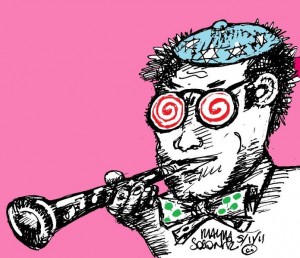 We didn’t get any gigs. We thought we might get a couple. For instance, Yiddishe Cup once played an OJ wedding for the daughter of an Orthodox blues harmonica player. The dad, who didn’t blow on shabbes, sat in with us.
We didn’t get any gigs. We thought we might get a couple. For instance, Yiddishe Cup once played an OJ wedding for the daughter of an Orthodox blues harmonica player. The dad, who didn’t blow on shabbes, sat in with us.
We were looking for Ortho gigs like that.
Still looking.
March 28, 2012 11 Comments
SHREDDING IT
Cleveland is in the middle of the cereal belt. Shredded Wheat of Niagara Falls, New York, is to the east, and to the west is Kellogg’s of Battle Creek, Michigan.
Shredded Wheat moved from Niagara Falls years ago, but the cereal belt remains. Cleveland is the buckle.
Clevelander Marty Gitlin just published a cereal encyclopedia, The Great American Cereal Book (Abrams Images), featuring “hundreds of images of vintage cereal boxes and spokes-characters — Tony the Tiger, Snap, Crackle, Pop, and Lucky the Leprechaun.”
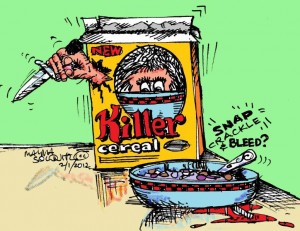
Test-marketed in Cleveland
I had a prospective store tenant who wanted to open a cereal store. He opened down the street and went under almost immediately. He was Cereal Central, aka Cerealicious. Nobody in Cleveland wanted to eat cereal in a store. (He also had a store in Columbus near Ohio State. Apparently, OSU students were willing to eat cereal in a restaurant.)
Most people like to eat cereal alone and not talk about it. That’s my guess.
In my temple bulletin, no bar mitzvah kid’s profile reads: “Jacob is interested in cereal.” More often it’s “Morgan enjoys Sudoku and chatting online, and is a member of the recycling club.”
What is Morgan’s cereal?
Marty Gitlin and I want to know.
***
Musicians — at least one — eat cereal at home after late-night gigs. Musicians can’t fall asleep after gigs. Musicians’ heads are filled with fruit loops of “Simon Tov” and “Hava Nagilah.” (Klezmer musicians’ heads, that is.)
Shredded wheat choices at 1 a.m.: Barbara’s shredded wheat or Quaker shredded wheat. (Shredded wheat is not trademarkable.) I mix Barbara’s with Autumn Harvest (Kashi).
—-
I wrote an “advice column” for the Ann Arbor Observer (February 2012). Check it out: “Hit the Road, Jack . . . A dad’s advice.”
Click here to hear what junior (Jack) is up to today: “Louder Naftule.” The latest in klezmer.
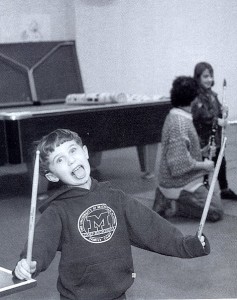
Drummer Jack Stratton, backed by clarinetists Merlin Shepherd and Lucy Stratton. KlezKamp, 1993. (Photo by Al Winn)
February 8, 2012 10 Comments
THE OPTIMAL LEVEL OF JEWISHNESS
If I didn’t lead a klezmer band, I might not hire one. Yiddishe Cup might be too Jewish for me.
“Too Jewish” means anything — or anybody — more Jewish than oneself. Example: Franz Rosenzweig, a German Jewish intellectual, said nothing Jewish — no matter how far out — was alien to him. I tried Franz’s approach: I davened (prayed) with the yeshiva buchers in Boro Park, Brooklyn; drank schnapps at Telshe Yeshiva, Cleveland; and soaked in the mikvah (ritual bath) in Cleveland Heights. Also, I read Rabbi Sherman Wine’s God-is-dead books. I covered a lot of humentashn (bases).
Would I hire a klezmer band?
Yes.
I did. I hired Yiddishe Cup three times — for my kids’ b’nai mitzvot parties. (And I got a decent price.)
1. For my daughter’s bat mitzvah party, I also hired a troupe of hospital-therapy dogs for the cocktail hour.
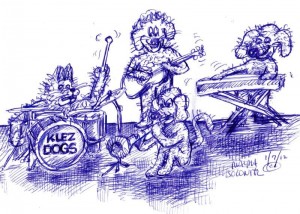
2. For my younger son, we had a DJ party, plus the klez band party. My son organized the DJ party. He hired the DJ — himself.
3. My older son had a trivia quiz, plus the klezmer band. That worked out well. He wound up on Jeopardy!
Yiddishe Cup plays, at minimum, 15 minutes of Jewish music, and we use a dance leader, so everybody knows what to do.
Naturally, the goys like us best. Jews have hang-ups.
I know about Jews and hang-ups. I have belonged to more shuls than the Pope. I was Reform, then Conservative, then Reform, and now Conservative again.
My friends and relatives don’t always hire Yiddishe Cup. But I go to their parties and have a good time. The weddings are enjoyable; the bar mitzvahs are sometimes difficult. The DJ and his “dance facilitators” can be loud and obnoxious. The DJ announces, “The young adults will gather on the dance floor for a group photo.”
Get in the picture yourself, DJ. You look 18. And the “young adults” are not young adults, they’re animals. Stow the glow sticks. Bring out the cattle prods.
The optimal level of Jewishness is Yiddishe Cup with therapy dogs.
—
Yiddishe Cup plays The Ark 8 p.m. Sat (Feb.4), Ann Arbor, Mich. Here is an unrepresentative video from last year’s show:
February 1, 2012 11 Comments
BEST SHOW IN VEGAS
I was back from Las Vegas, attending a Shaker Heights brunch. Several people asked, “Did you play?”
Did Yiddishe Cup play Vegas?
I wish Yiddishe Cup had played Vegas.
I had been in Las Vegas on vacation with my wife, Alice, and older son, Teddy. I had played blackjack.
That was my second trip to Vegas. My first trip was in 1962, when a Vegas waitress predicted I (then-12 years old) would return to Nevada for my honeymoon. That waitress was very wrong.
I prefer outdoorsy vacations.
On my latest trip I won $7.50 at blackjack at the Jokers Wild, then quit. I could hardly breathe in the Jokers Wild –- or in any other Nevada casino — because of the cigarette smoke. I hung around the casino parking lot, waiting for Teddy and Alice to finish up.
My favorite Las Vegas attraction is the Red Rock Canyon, which is similar to Zion National Park, but only 17 miles from Vegas.
The Red Rock performs daily in an original revue that is F’n Crazy! Be a Part of It! Best Show in Vegas for the Past 900 Years!
***
December 28, 2011 5 Comments
NO EVIDENCE OF DISEASE
Doctors like to complain how their pay isn’t what it used to be. Another gripe of docs is the increased paperwork.
But doctors do all right. They are one of the few professions that still hire bands.
A side benefit for Yiddishe Cup is we sometimes get free medical advice at gigs. At a Pittsburgh wedding, a doctor checked one of our guys for a hernia in the men’s room stall.
In Cleveland, a doctor asked me for an appointment. He was a Washington heart specialist, considering a job at the Cleveland Clinic. He played mandolin. He wanted to know if Cleveland had a good quality of life.
I said yes.
He spent several years at the Cleveland Clinic giving me –- and others — the lowdown on HDL. (The lowdown is there is no sure-fire way to raise your HDL.)
Yiddishe Cup occasionally gets gigs from immigrant doctors from South Africa. One doc had a diploma on his office wall from the University of Witwatersrand (South Africa). I thought “witch doctor” — like the doctor in the Mickey Katz parody “My Son the Knish Doctor.” The Katz doc had studied at the Bwana Wana Yeshiva.
South African doctors are often Litvaks (Lithuanian Jews) and plugged into Yiddish culture — what’s left of it.
***
I met a doc at Klezkamp who was atrocious on soprano sax and would repeat, “I’m a doctor! I’m a doctor!” That worked. It made him feel better.
He had a point. He saved lives. So what if he couldn’t play “Khasidim Tantz”?
Yiddishe Cup had a medical student in the band. Dave Jaffe, guitarist/singer and Case medical student. He lasted a year. Med school and the band were too much.
Doctors often form their own bands because of their busy schedules. These bands play a couple benefits a year and often have names like No Evidence of Disease.
I wish I had studied harder in Inorganic and Organic Chemistry. I wouldn’t mind being a brain surgeon with a side interest in klezmer.
Turns out I’m a klezmer musician with a side interest in brain surgery. This scares people.
I accept most insurance plans.
October 5, 2011 3 Comments
THE VANITY OF KLEZMER
I could get the Ohio klezmer vanity plate.
In Chicago, a musician from the Maxwell Street Klezmer Band has the Illinois klezmer. I saw the Illinois plate on the cover of a Maxwell Street CD.
klezmer is taken in New York. I saw New York klezmer in the KlezKamp parking lot.
Ohio klezmer is available, according to the Ohio Bureau of Motor Vehicles.
Do I want klezmer? What if I cut somebody off; they’ll know it’s me. (I remember getting cut off by ezras.)
What if I’m checking out a potential tenant, and I’m parked by the guy’s sleazy mini-market on West 25th Street, and he comes out and has an anti-klezmer ’tude.
I remember mazel on Fairmount Boulevard.
I’ve seen yenta.
I’ve seen gevalt.
On Ohio’s newest license plate, you practically need a microscope to find the OHIO. Why does the state devalue Ohio so much? Ohio is pretty catchy compared to other states. How would you like to live in Maryland?
oHIo.
That’s my gift to the BMV.
Ohio first cluttered its plates in 1973 with Seat Belts Fastened? That innocent public service opened the doors to Birthplace of Aviation, Bicentennial 2003 and Beautiful Ohio.
OHIO in big block letters would work. If the BMV ever goes retro, back to block OHIO, 1950s-style, I would seriously consider klezmer.
I want a plate I can nail to the side of the barn and be proud of.
—
Footnote: Jewish license plates in California are well-documented, per this video:
September 14, 2011 8 Comments

